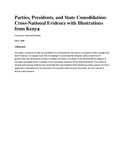| dc.contributor.author | Thompson, Marshall Weldon | |
| dc.date.accessioned | 2013-06-24T05:59:15Z | |
| dc.date.available | 2013-06-24T05:59:15Z | |
| dc.date.issued | 2009 | |
| dc.identifier.citation | African and Asian Studies, Volume 8, Number 4, 2009 , pp. 345-374(30) | en |
| dc.identifier.uri | http://www.ingentaconnect.com/content/brill/afas/2009/00000008/00000004/art00001 | |
| dc.identifier.uri | http://erepository.uonbi.ac.ke:8080/xmlui/handle/123456789/38646 | |
| dc.description.abstract | This paper conceives of state consolidation as comprising the two distinct concepts of state strength and state firmness. It is argued here that increasing the accountability between various branches of government and limiting the number of parties will lead to increases in the administrative capacity of the state (strength) and to increases in the republican character of the state (firmness). The results of several least squares analyses are combined with case evidence from Kenya to provide support for these arguments. Implications for bureaucratic and economic efficiency are discussed, as is the nature of African party systems. | en |
| dc.language.iso | en | en |
| dc.publisher | Univesity of Nairobi | en |
| dc.subject | Bureaucracy; Governance; Kenya; Legislatures; Parties; States | en |
| dc.title | Parties, Presidents, and State Consolidation: Cross-National Evidence with Illustrations from Kenya | en |
| dc.type | Article | en |
| local.publisher | Department of Political Science | en |

